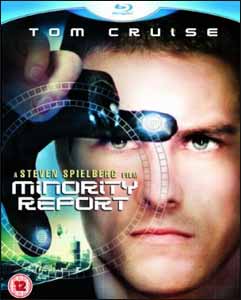|
Click here to return to the main site. John Underkoffler - Minority Report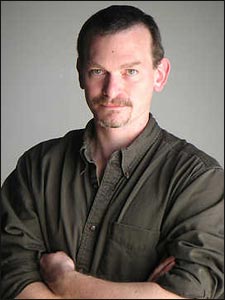 John Underkoffler was born in Pennsylvania on 30 June 1967. While completing his doctoral work at Massachusetts Institute of Technology (MIT) Underkoffler invented the I/O bulb, which lead to the development of the Luminous Room. Underkoffler saw the I/O bulb as a multi-purpose invention that would allow any architectural space to be used as a surface to display visual information. Underkoffler is best known for his invention of the gestural interface system called G-Speak also developed during his doctoral studies. This is an interactive system were data is lifted off from the computer screen and transferred into real space. A similar interface system was developed for the film Minority Report, on which Underkoffler served as a science and technology advisor. Darren Rea caught up with Underkoffler as Minority Report was released on Blu-ray... Darren Rea: How did you originally get involved with Minority Report? John Underkoffler: Let's see, it was about 1999 and I was just finishing up a decade and a half of work at the MIT (Massachusetts Institute of Technology) media lab and early preproduction was just getting rolling on Minority Report. The legendary production designer Alex McDowell visited my lab. He was looking for emerging technologies that might be interesting to kind of import into the film.
DR: Where you surprised at how much time and effort went into making the future technology as realistic as possible? JU: Yeah. That is something that is actually remarkable and very unusual in films. It's a great luxury really that we had and it's partly due to Steven's [Spielberg] interest in making it a believable 2054 so that people wouldn't fixate on it - so that he could tell his noir story, which was how he viewed it. But partly it was also sue to the amazing mind of Alex McDowell who wanted to dive in and build an absolutely authentic future world that was completely recognisable from our position in 2002, I guess, when the movie came out. Alex has such an eye for detail, and a real sense for connective detail - the way all of the pieces fit together so as to provide this sense that it's a real world that evolved from ours rather than a bunch of, say, individual gadgets that someone stuck on a set. DR: How self conscious were the actors of performing the hand gestures on set. Did they just go with it, or did it take some time to get them to relax?
DR: After the movie the hand movements went on to become part of the g-speak spatial operating environment that you helped to develop. Can you tell us more about that and where that technology is at the moment? JU: It's been an interesting arc. It started in the real world, albeit in academia of course - That was the stuff that I was building back at MIT. It got sort of simplified and purified in a sense by running it through the film process and we've reemerged back into the real world where we're building that stuff, this time in a commercial context, because we want the whole world to use it. The stuff really works that's the best thing of all. It's incredibly accurate and it turns out to be a great way to interact with a computer. In the film ultimately of course it was very precise pantomime because there was nothing on the screen, we composited all that stuff later. Although, the actors knew what they were looking at, what they would be seeing and how the gestures would affect all that. But having it actually work is a great thrill. DR: On the Blu-ray there's a feature where you show how the technology could be used to do things like compositing various elements in movie production editing. What sort of applications is it currently being used for and what do you see it being used for in the future? JU: Our present customers and clients use it for a large array of professional activities and they use it successfully and every day for things from financial analysis to air traffic control and simulations, logistics and supply chain management, bioinformatics and pharmaceutical protein folding. So the big data problems are already really pleasingly susceptible to this kind of interface as a really powerful way to get your hands around that stuff. DR: When you're showing perspective clients the technology are they ever concerned that they may scratch their nose or sneeze and lose all their data?
It's an issue of design for us. We deal with it in a bunch of different ways. There are stop listening gestures that you can produce - sort of time out gestures, essentially, after which you're free to do whatever you need to do in the real world and then start listening again. We can also make some regions of space inactive. So if your particular application has you standing, then we can arrange it so that if your hands are below your waist the system doesn't recognise it... DR: The technology as shown in the movie is in use in 2054, how long do you think before what you're working on is actually capable of being used in a similar way? JU: Right, we don't have anything to say about the precogs [laughs] someone else is going to have to be responsible for that. Everything else that you see in the film we're actually doing today. So we're ahead of schedule. DR: So Minority Report is already out of date?
DR: Surveillance technology is something that's highlighted in the movie. Is that something that bothers you in the present time, that more and more of our movements are being captured? JU: It bothers me greatly. The film indicates that we'd get to that stage because advertisers wanted to track users so that they could advertise to you. Here in the real world we're getting there quickly but in a different way. Countries and States that are obsessed with security, ultimately in an ineffectual way, but it doesn't stop them from putting up cameras and compromising everyone's privacy. And the real problem is that it isn't enough in peoples consciousness. So really, as a species, as a society, we ought to be making some choices about that stuff - or at least be engaging in dialogue about it. But for the most part it's happening quietly in such a way that we don't. We're not having discussions and I think it's a huge problem. DR: What's the one piece of technology that you couldn't do without.
DR: You've also been involved in quite a few other movies, including Iron Man, does that mean you've got to keep abreast of the latest technologies all the time? JU: Yes, and of course the Internet is a fantastic tool for that. It's been interesting over the last 10 years to watch how it's gotten easier and easier to stay on top of stuff and be aware of the freshest advances. It means that it's proportionately less valuable when you do find something new because everyone else knows about it right away as well. It's a tricky proposition to design stuff that will appear genuinely or interestingly enough to appear in films. DR: What was the last thing you heard about that totally blew you away?
There's some really interesting work going on right now going on in analysis of vague electro magnetic emissions from the brain. There are a few companies that are actually making surprising strides to what amounts, I think, to brain readings - mind readings. And there's some amazing academic work there as well. John Donoghue at Brown University, and others, are affording the possibility of movement and communication to paralysed individuals and those who have no other way to get ideas out of their head. That's about as futuristic as it could possibly get isn't it? DR: I used to be the features editor of Electronic Engineering Times and the one thing I always thought fascinating was theoretical transporting technology that has been shown to actually work in a laboratory. JU: [Laughs] I guess you and I are still waiting for that. That's a good point. That is the most transformative thing I can imagine - no other advance would sort of completely turn everything about the way we live our lives upside down. DR: What's the one thing your sat at home waiting to be invented and brought to the market to make your life easier? JU: I'm sorry, I'm a really bad interviewee on topics like that. I would love some peace - for a moment of quiet. I would like to not be bombarded with information.
Minority Report is available on Blu-ray from Twentieth Century Fox Home Entertainment from 17 May 2010. Click here to buy this Minority Report on Blu-ray for £13.99 (RRP: £22.99) This interview was conducted on 14 April 2010 Return to... |
|---|
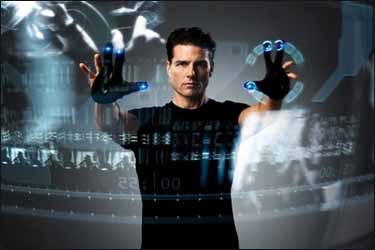 He and I immediately got on well and the stuff I was working on, the kind of novel interface stuff, was, I guess, precisely the sort of thing that he knew was going to have to be featured in the film. There's a moment when Alex calls you, it's months later and he says: "John, would you like to help us with the film then?" and you say: "Yeah," and he says: "Great. Get on a plane". And that's literally what happens, so I went to LA and spent about a year of my life building pieces of the film.
He and I immediately got on well and the stuff I was working on, the kind of novel interface stuff, was, I guess, precisely the sort of thing that he knew was going to have to be featured in the film. There's a moment when Alex calls you, it's months later and he says: "John, would you like to help us with the film then?" and you say: "Yeah," and he says: "Great. Get on a plane". And that's literally what happens, so I went to LA and spent about a year of my life building pieces of the film.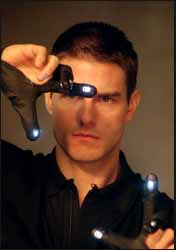 JU: Part of luxury that Alex afforded us was to develop the language thoroughly and then spend days with the actors in advance of filming basically teaching them that language. So by the time they got on set they basically knew that language; they knew the semi-fictional interface language. So I would say, by and large, they were not self conscious at all. It had become second nature by then.
JU: Part of luxury that Alex afforded us was to develop the language thoroughly and then spend days with the actors in advance of filming basically teaching them that language. So by the time they got on set they basically knew that language; they knew the semi-fictional interface language. So I would say, by and large, they were not self conscious at all. It had become second nature by then.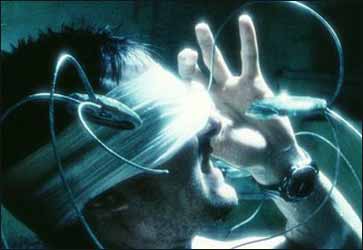 JU: There's often some discussion of that... and of course that joke is in the film. There's that scene where Colin Farrell's character comes in and moves to shake Anderton's hand and Anderton moves to shake his hand - because it's an autonomic thing we do when someone offers to shake our hand - and of course the entire screen is kind of moved down into a corner.
JU: There's often some discussion of that... and of course that joke is in the film. There's that scene where Colin Farrell's character comes in and moves to shake Anderton's hand and Anderton moves to shake his hand - because it's an autonomic thing we do when someone offers to shake our hand - and of course the entire screen is kind of moved down into a corner.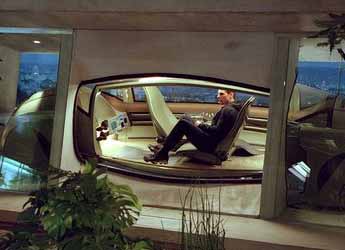 JU: That's been the most astonishing thing. So many of these individual technologies that we chose to weave into the fabric of the future fictional world have already started to emerge in one way or another.
JU: That's been the most astonishing thing. So many of these individual technologies that we chose to weave into the fabric of the future fictional world have already started to emerge in one way or another.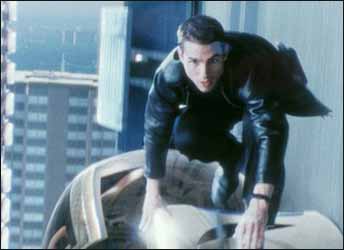 JU: If we're really honest with ourselves there's not a lot that you couldn't do without. The truth is that moment by moment, day by day, we rely on phone lines and we're tethered to computers and digital information streams. Whether we like it or not we are now circumscribed by that kind of information and those kind of interactions. There's no way around it. Banks don't even want to send you statements in the post anymore.
JU: If we're really honest with ourselves there's not a lot that you couldn't do without. The truth is that moment by moment, day by day, we rely on phone lines and we're tethered to computers and digital information streams. Whether we like it or not we are now circumscribed by that kind of information and those kind of interactions. There's no way around it. Banks don't even want to send you statements in the post anymore. JU: [Pause]... Right, the fact that I'm having a hard time thinking about that, I think, is telling.
JU: [Pause]... Right, the fact that I'm having a hard time thinking about that, I think, is telling.